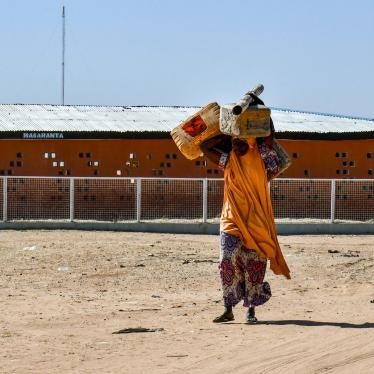(New York) - Human Rights Watch warned that unless the international community takes immediate steps to address the desperate plight currently facing Sierra Leonean refugees in Liberia, it is likely that the situation will worsen and ultimately pose a bigger burden to the international community.
Human Rights Watch, which visited the camps last week, found that some 32,000 Sierra Leonean refugees in one camp in Lofa county, Liberia are receiving inadequate assistance and face serious security threats due to their proximity to the border of Sierra Leone where fighting continues. The UNHCR, in conjunction with the Liberian government and other humanitarian organizations, must urgently develop and implement a clear plan to assist and protect refugees in Lofa county.
"The refugees are in need of immediate food, medicine and other aid, assistance with their relocation to new, safer camps farther away from the border, and protection from combatants," said Peter Takirambudde, executive director for Africa at Human Rights Watch. "Yet, the international community and humanitarian agencies have been slow to provide such assistance, apparently due to the risk of international aid being diverted to support active combatants in Sierra Leone."
Human Rights Watch emphasized that the lack of a concerted international plan to provide aid and address protection issues head on is likely to worsen the humanitarian disaster and increase the possibility of the violence spreading into Liberia. The most vulnerable refugees are paying the price for the reluctance of the international community to provide assistance: as local food sources dwindle, malnutrition and disease, especially among infants and children, are rising. As time passes, these refugees will become physically weaker and less able to relocate themselves. Moreover, as the humanitarian situation deteriorates, security conditions will likely degrade. The lack of adequate food and medical care for the refugees has increased tensions in the camp and could lead to violence.
Former combatants, some of whom may have been responsible for gross atrocities against the civilian population in Sierra Leone, including killings, amputations, rape, sexual violence, and abductions, remain mixed with the general refugee population. Unless this problem is addressed, and combatants are separated from the general refugee population in both camps in the area, violence will likely escalate. In addition, many disarmed ex-combatants in the camps have expressed their desire to be re-integrated into society, but given the lack of other options or assistance, the combatants are likely to re-arm themselves, divert aid in the camps, and resort to fighting or banditry in Liberia or Sierra Leone.
An effective relief plan should include the provision of emergency aid to refugees as well as a rapid and humane approach to relocation to safer camps farther away from the border. The most vulnerable refugees should be assisted to the extent possible with their relocation, including the provision of transport for the malnourished, sick, and elderly, as well as sufficient health posts, emergency food and shelter, and security on the road between the camps. Efforts to separate former combatants from the general refugee population must be put into place. The relocation of the refugee population provides an opportunity to establish a screening procedure to separate ex-combatants from refugees. Where appropriate, those responsible for committing war crimes should be prosecuted and held accountable for their crimes.






